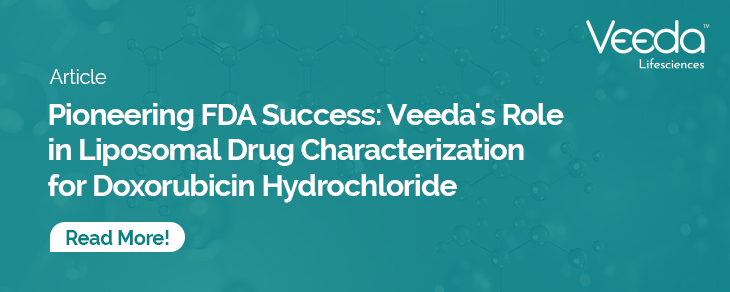Articles


Pioneering Excellence in lipsomal Drug Characterization
Veeda Lifesciences’ Analytical Team Leads Critical Work on Doxorubicin Hydrochloride Liposome Injection
The recent FDA approval of Doxorubicin Hydrochloride Liposome Injection for treating ovarian cancer, AIDS-related Kaposi’s sarcoma, and multiple myeloma represents a significant milestone in cancer therapeutics.
Behind this achievement lies the exceptional analytical work conducted by the Analytics and Characterization Department of Veeda Lifesciences’ Biopharma Division, whose contribution to nano-DSC method development and qualification has been instrumental in advancing this life-saving treatment.
The Therapeutic Significance of Liposomal Doxorubicin
Doxorubicin Hydrochloride Liposome Injection, commonly known as Doxil, represents a revolutionary advancement in cancer chemotherapy.
As the first FDA-approved nano-drug in 1995, it fundamentally transformed cancer treatment by encapsulating the potent anticancer agent doxorubicin within pegylated liposomes.
This innovative formulation addresses the critical limitation of conventional doxorubicin—its severe cardiotoxicity—while enhancing therapeutic efficacy through improved tumor targeting.
The drug’s mechanism involves three critical principles: prolonged circulation time through pegylated nano-liposomes that avoid the reticuloendothelial system, stable remote loading of doxorubicin driven by transmembrane ammonium sulfate gradients, and maintenance of the liposome lipid bilayer in a liquid ordered phase.
These characteristics enable passive targeting to tumors through the enhanced permeability and retention (EPR) effect, allowing for preferential accumulation in malignant tissues.
Clinical Applications and FDA Approvals
The FDA approval history of liposomal doxorubicin demonstrates its expanding therapeutic utility.
Initially approved in November 1995 for AIDS-related Kaposi’s sarcoma, the indication was based on compelling clinical evidence showing superior efficacy compared to conventional treatments.
In phase II studies, liposomal doxorubicin achieved remarkable response rates of 73.5% in AIDS-related Kaposi’s sarcoma patients, with doxorubicin concentrations in KS lesions reaching 10-20 times those in normal skin.
The drug’s utility was further validated in ovarian cancer, receiving accelerated approval in 1999 and full approval in 2005 for patients whose disease progressed after platinum-based chemotherapy.
Clinical trials demonstrated substantial activity against platinum- and paclitaxel-resistant ovarian cancer, with response rates of 25.7% and a median progression-free survival of 5.7 months.
The liposomal formulation’s reduced cardiotoxicity profile made it particularly valuable for patients requiring prolonged treatment.
In 2007, the FDA approved liposomal doxorubicin in combination with bortezomib for multiple myeloma treatment.
The pivotal Phase III trial demonstrated a significant improvement in time to progression, from 6.5 months with bortezomib alone to 9.3 months with the combination therapy.
This approval expanded treatment options for patients with relapsed or refractory multiple myeloma who had not previously received bortezomib.

The Critical Role of Analytical Characterization
The development and regulatory approval of complex liposomal formulations like Doxil requires sophisticated analytical methods to characterize their physicochemical properties, stability, and performance characteristics.
The Analytics and Characterization Department at Veeda Lifesciences’ Biopharma Division has established itself as a leader in this specialized field, particularly through their expertise in nano-differential scanning calorimetry (nano-DSC) method development.
Advanced Instrumentation and Capabilities
Veeda’s Analytics and Characterization Department is equipped with state-of-the-art instrumentation specifically designed for the comprehensive characterization of complex biologics and liposomal formulations.
The department’s capabilities include high-resolution mass spectrometers for precise molecular characterization, high-performance liquid chromatography (HPLC) systems for purity and potency analysis, and size exclusion chromatography coupled with field-flow fractionation and multi-angle light scattering (SEC/FFF-MALS) for molecular weight and size distribution analysis.
The analytical arsenal also encompasses capillary electrophoresis (CE) for charge-based separations, Fourier-transform infrared spectroscopy (FTIR) for structural characterization, circular dichroism (CD) spectroscopy for protein secondary structure analysis, and dynamic light scattering (DLS) for particle size and polydispersity measurements.
However, the crown jewel of their analytical capabilities is the nano-differential scanning calorimetry (nano-DSC) instrumentation, which has proven invaluable for liposomal drug characterization.

Nano-DSC: A Powerful Tool for Liposomal Characterization
Differential scanning calorimetry (DSC) has emerged as an indispensable technique for studying the thermodynamic properties of liposomal drug delivery systems.
The nano-DSC instrument offers exceptional sensitivity for detecting thermal transitions in biological macromolecules and lipid-based formulations, making it ideally suited for characterizing complex liposomal products like Doxil.
For liposomal doxorubicin characterization, nano-DSC provides critical insights into the thermotropic behavior of the formulation.
The technique can detect multiple distinct endothermic transitions: the membrane lipid phase transition occurring around 51°C despite high cholesterol content, and the melting of intraliposomal doxorubicin-sulfate nanocrystals at approximately 70°C.
These thermal signatures provide essential information about the structural integrity and stability of the liposomal formulation.
The high sensitivity of nano-DSC enables the detection of subtle changes in liposomal structure that might indicate formulation instability or batch-to-batch variations.
This capability is particularly crucial for regulatory submissions, where demonstrating consistent product quality and stability is essential for FDA approval.
The reversibility of phase transitions observed in cycled DSC scanning indicates excellent physical and chemical stability of the liposomal formulation.

Veeda’s Contribution to Method Development and Qualification
The Analytics and Characterization team at Veeda Lifesciences has made significant contributions to the development and qualification of nano-DSC methods for Doxorubicin Hydrochloride Liposome Injection characterization.
Their work has been instrumental in establishing robust analytical procedures that meet stringent regulatory requirements for USFDA approvals.
Method Development Excellence
Method development for nano-DSC analysis of liposomal formulations requires extensive expertise in both thermal analysis techniques and liposomal drug delivery systems.
Veeda’s analytical team has demonstrated exceptional competency in developing methods that provide reliable, reproducible, and meaningful data for regulatory submissions.
Their approach involves systematic optimization of experimental parameters, including heating rates, sample preparation procedures, and baseline correction methods to ensure accurate measurement of thermal transitions.
The team’s expertise extends to understanding the complex relationships between liposomal composition, structure, and thermal behavior.
They have developed methods capable of distinguishing between membrane phase transitions and drug crystallization events, providing crucial information about formulation stability and drug release characteristics.
This level of analytical sophistication is essential for supporting regulatory submissions and ensuring product quality.
Qualification and Validation Protocols
Method qualification represents a critical phase in analytical method development, requiring demonstration that the method is suitable for its intended purpose and meets regulatory requirements.
Veeda’s analytical team has established comprehensive qualification protocols for nano-DSC methods, including assessment of specificity, accuracy, precision, linearity, range, and robustness.
The qualification process involves extensive testing under various conditions to ensure method reliability and reproducibility.
This includes evaluation of different sample preparation techniques, assessment of temperature calibration accuracy, and validation of data analysis procedures.
The team’s meticulous approach to method qualification ensures that the analytical methods meet the highest standards required for regulatory submissions to the FDA.
Regulatory Compliance and Quality Assurance
Veeda’s Biopharma Division operates under stringent regulatory and quality benchmarks designed to meet USFDA approval requirements.
The Analytics and Characterization Department has implemented comprehensive quality management systems that ensure all analytical work meets Good Manufacturing Practice (GMP) standards and regulatory guidelines.
The department’s commitment to regulatory compliance is evidenced by their recent approval from the Department of Scientific and Industrial Research (DSIR), Ministry of Science & Technology, Government of India.
This recognition acknowledges their R&D capabilities and reinforces their position as a leading provider of analytical services for biopharmaceutical development.
Global Impact and Client Success
The exceptional work of Veeda’s Analytics and Characterization team has contributed to the success of global biopharmaceutical clients in advancing their liposomal drug development programs.
Their expertise in nano-DSC method development and qualification has been instrumental in supporting regulatory submissions for complex drug products, including the recent success with Doxorubicin Hydrochloride Liposome Injection.
Supporting Global Pharmaceutical Development
Veeda’s Biopharma Division serves the research and development needs of global biopharmaceutical and biotechnology clients, offering comprehensive analytical and bioanalytical solutions tailored to complex biologics and biosimilar programs.
Their work extends across diverse biopharmaceutical modalities, including GLP-1 analogs, monoclonal antibodies, bispecific antibodies, antibody-drug conjugates, fusion proteins, peptides, and nucleic acid-based therapies.
The team’s expertise in liposomal characterization has positioned them as preferred partners for pharmaceutical companies developing next-generation drug delivery systems.
Their analytical capabilities support all phases of drug development, from early-stage formulation optimization to commercial product release testing.
Industry Recognition and Scientific Excellence
The quality and impact of Veeda’s analytical work have earned recognition within the pharmaceutical industry and scientific community.
Their contribution to the development of Doxorubicin Hydrochloride Liposome Injection represents a significant achievement in supporting life-saving cancer therapies.
The successful FDA approval of this complex liposomal formulation demonstrates the critical importance of robust analytical characterization in drug development.
The team’s expertise is regularly sought by pharmaceutical companies facing complex analytical challenges in biologics and advanced drug delivery systems.
Their reputation for scientific excellence and regulatory compliance has established them as trusted partners in the global pharmaceutical development ecosystem.
Future Directions and Technological Advancement
As the pharmaceutical industry continues to advance toward more sophisticated drug delivery systems, the role of analytical characterization becomes increasingly critical.
Veeda’s Analytics and Characterization team is well-positioned to support these developments through continued investment in advanced analytical technologies and method development expertise.
Emerging Technologies and Applications
The field of liposomal drug delivery continues to evolve with the development of “smart” liposomes that respond to specific disease microenvironments.
These advanced formulations require sophisticated analytical methods to characterize their stimuli-responsive properties and release mechanisms.
Veeda’s expertise in nano-DSC and other thermal analysis techniques positions them to support the development of these next-generation therapeutics.
The integration of artificial intelligence and machine learning in analytical method development represents another frontier where Veeda’s team can contribute.
These technologies can enhance method optimization, improve data analysis capabilities, and accelerate method development timelines.
Expanding Therapeutic Applications
The success of liposomal doxorubicin has paved the way for numerous other liposomal therapeutics across various therapeutic areas.
Beyond oncology, liposomal formulations are being developed for infectious diseases, inflammatory conditions, and gene therapy applications.
Veeda’s analytical capabilities are well-suited to support this expanding field of liposomal drug development.
The recent COVID-19 pandemic has highlighted the importance of liposomal-based vaccines and antiviral therapies, creating new opportunities for analytical service providers with specialized expertise in liposomal characterization.
Veeda’s established capabilities position them to support these critical public health initiatives.
Conclusion: Excellence in Scientific Partnership
The exceptional work conducted by the Analytics and Characterization team at Veeda Lifesciences’ Biopharma Division exemplifies the critical role of specialized analytical expertise in advancing pharmaceutical development.
Their contribution to nano-DSC method development and qualification for Doxorubicin Hydrochloride Liposome Injection has been instrumental in supporting the regulatory approval of this life-saving cancer therapy.
The team’s expertise in liposomal characterization, combined with their commitment to regulatory compliance and scientific excellence, has established Veeda as a trusted partner for global pharmaceutical companies developing complex drug delivery systems.
Their advanced analytical capabilities, state-of-the-art instrumentation, and rigorous quality management systems ensure that clients receive the highest quality analytical support for their drug development programs.
As the pharmaceutical industry continues to advance toward more sophisticated therapeutics, the expertise and capabilities of Veeda’s Analytics and Characterization team will remain essential for supporting innovation in drug delivery and therapeutics.
Their proven track record of success in supporting regulatory approvals for complex products, such as Doxorubicin Hydrochloride Liposome Injection, demonstrates their ability to meet the evolving needs of the global pharmaceutical industry.
The successful FDA approval of Doxorubicin Hydrochloride Liposome Injection for multiple cancer indications represents not only a significant advancement in cancer treatment but also a testament to the exceptional analytical expertise and scientific rigor of Veeda’s team.
Their contribution to this achievement underscores the vital importance of specialized analytical services in bringing life-saving therapies to patients worldwide.
Through their continued commitment to scientific excellence, technological advancement, and regulatory compliance, Veeda’s Analytics and Characterization team will undoubtedly continue to play a crucial role in advancing the development of innovative therapeutics and improving patient outcomes globally.
Their partnership approach and deep technical expertise make them invaluable allies in the quest to develop safer, more effective treatments for patients in need.
References
- https://books.rsc.org/books/edited-volume/1881/chapter-abstract/2464610/DoxilR-the-First-FDA-approved-Nano-drug-from?redirectedFrom=fulltext
- https://pubmed.ncbi.nlm.nih.gov/11363051/
- https://pubmed.ncbi.nlm.nih.gov/22484195/
- https://pubmed.ncbi.nlm.nih.gov/19707541/
- https://pmc.ncbi.nlm.nih.gov/articles/PMC2731020/
- https://pmc.ncbi.nlm.nih.gov/articles/PMC2676669/
- https://hemonc.org/wiki/Pegylated_liposomal_doxorubicin_(Doxil)
- https://ascopubs.org/doi/10.1200/JCO.1995.13.4.914
- https://www.cancernetwork.com/view/doxil-wins-full-approval-relapsed-ovarian-ca
- https://pubmed.ncbi.nlm.nih.gov/9060537/
- https://pubmed.ncbi.nlm.nih.gov/11330951/
- https://www.cancernetwork.com/view/liposomal-doxorubicin-combination-bortezomib-relapsed-or-refractory-multiple-myeloma
- https://pubmed.ncbi.nlm.nih.gov/18077994/
- https://ascopubs.org/doi/10.1200/JCO.2006.10.5460
- https://pmc.ncbi.nlm.nih.gov/articles/PMC3053520/
- https://pubmed.ncbi.nlm.nih.gov/27106607/
- https://www.tainstruments.com/applications-notes/studying-liposomes-in-the-nano-dsc/
- https://www.tainstruments.com/pdf/literature/MCAPN-2012-02.pdf
- https://pubmed.ncbi.nlm.nih.gov/28450207/
- https://www.linkedin.com/posts/veedacr_veeda-veedacr-veedaclinicalresearch-activity-7125761765350531072-mws5/
- https://www.nature.com/articles/s41598-024-82228-7
- https://www.linkedin.com/posts/veedacr_veeda-veedagroup-biopharma-activity-7176552007820795905-DzJN/
- https://www.linkedin.com/posts/veedacr_veeda-veedacr-veedaclinicalresearch-activity-7125761765350531072-mws5/
- https://pmc.ncbi.nlm.nih.gov/articles/PMC11794392/

